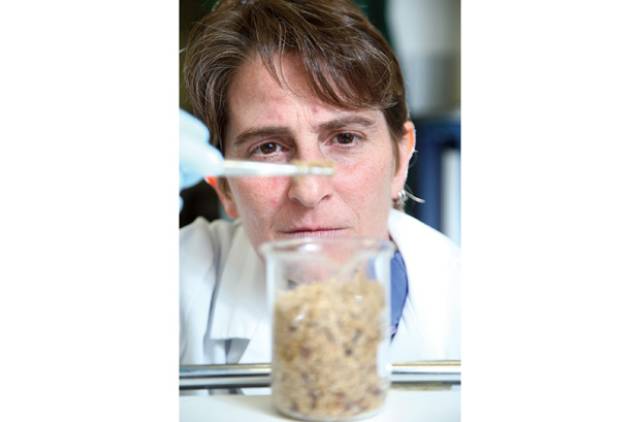 Interview Dr. Elaine Fitches, researcher at Durham University and ProteInsect Project co-ordinator
Interview Dr. Elaine Fitches, researcher at Durham University and ProteInsect Project co-ordinator
Very shortly: what’s ProteInsect Project?
PROteINSECT is a European funded project investigating the potential use of fly larvae grown on organic wastes as a source of protein for incorporation into animal feed and as a means of reducing waste volumes.
I can see everyday chickens in my garden catching worms and insects, why do we need so much time and scientific trials to understand that fish and poultry (for example) can be fed with insects-based feed?
Nutrition is a critical aspect for the successful and economic rearing of animals and fish for human consumption. Extensive testing is required to establish if insects are a nutritious and safe source of protein (or fat) for use in animal feed. Evidence from such trials can be used to inform regulatory bodies to help them decide if changes should be made to the legislation to allow insects to be used in animal feed. In addition these trials provide valuable information as to appropriate levels of inclusion of insect material (crude or refined protein or fat) in animal feed to feed companies.
Many say that massive insects breeding will lead to the same problems (concentration, animal’s health, use of chemicals, methane emission, etc.) we have today in massive cattle (and other animals) breeding, what’s your opinion?
The aim is to rear insects on low value substrates; if you consider food processing waste and perhaps eventually manures (if the legislation should permit this in the future), the mass rearing of insects should lead to reductions in waste which is a benefit to the environment (consider the fact that a huge amount of land is currently used to grow crops for animal feed). So: no, I don’t believe that mass rearing of insects will lead to the same problems as livestock rearing, it should actually reduce such problem.
The welfare of insects certainly needs to be considered. Apart from ethical issues, as for livestock, if insects are not healthy then the insect product will not be optimal for animal feed…and insects need to be healthy if productivity is to be high. The necessary procedures (HACCP) would need to be in place to ensure safety during rearing and feed production.
For what concerning the use of chemicals, I am not quite sure what you mean: if you are referring to antibiotic use in livestock rearing then I don’t think antibiotics will be used in mass rearing of insects, if you are referring to chemicals used to grow/protect crops from pathogens (fungal, bacterial and insects) then rearing insects should actually reduce this problem.
Referring to methane emissions, I can say that the limited amount of research that has been conducted so far suggests that emissions from large scale insect rearing would have much less of an environmental impact as compared to livestock rearing. However, this is an area that requires further research.
Some others say that the insects-based feed market will be soon ruled by the biggest multinational companies in the “traditional” feed industry, do you agree with this forecast?
There is a huge potential global market for insect protein in animal feed and thus it is likely that in the longer term large multinational companies will dominate the market. However, whether these companies will be tradional feed companies or new companies remains to be seen.
What’s the biggest technical obstacole you’ve met in the rearing cycle?
A number of technical challenges have been met in the establishment of new rearing systems in different countries (eg. Africa and China) within our project, for example variability in the yield of insects using the same substrate- but these systems are not commercial. The biggest technical challenge in the establishment of large scale rearing systems I believe will be in the automation of the rearing process which is a necessary step if large scale insect production is to become economically viable in developed countries.
The energy bill deriving from rearing insects in a country where the climate is not suitable for them, plus the lower labour-cost, offer a market-advantage to producers based in the East or in Africa. Could this be the reason why the european producers will play a marginal role in this industry?
I believe that progress in the development of energy efficient processes and innovations in engineering solutions will lead to the potential for economically viable mass rearing around the world.
Entrepreneurs in this industry can’t wait too long before starting earning money from their companies, do you think this could happen in a reasonable time frame?
I really cannot say how long the regulations may take to change that will allow entrepeneurs to start making a profit but there are real signs for progress in this area.
What’s your opinion about human entomophagy development in the western world?
I think that with time more and more people will at least try insects in the Western world. Whether or not insects are enjoyed as much as meat or fish, and how such products are marketed will play a major factor in deciding if entomophagy becomes commonplace.





